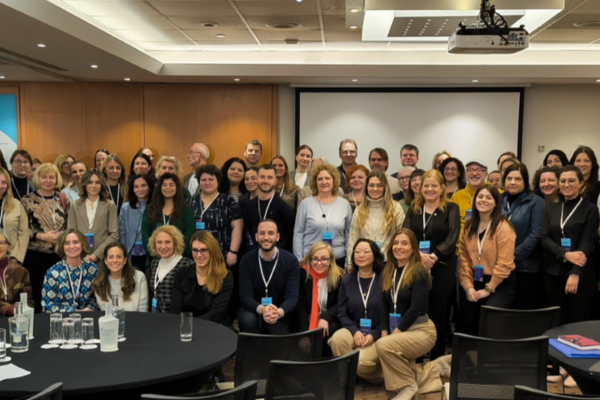
A conference to empower future teachers through eTwinning

The ‘Fostering citizenship education through eTwinning for future teachers’ conference took place onsite in Budapest from 28 to 30 November 2024. The event, which was also livestreamed online, gathered teachers, teacher trainers, student teachers and experts to examine the transformative role eTwinning can play in Initial Teacher Education (ITE).
Day 1
The conference opened with a keynote speech entitled ‘European values: a ‘challenge’ or an ‘invitation’ for citizenship education?’ Prof. Márta Fülöp, from the Károli Gáspár Reformed University in Budapest and scientific advisor and head of the social and cultural psychology department of the Hungarian Research Network, explored educational practices that can promote democratic citizenship and active engagement with social issues.
Shortly afterward, we awarded the 2024 eTwinning prize to the winning ITE institution, the University of Zagreb. Prof. Ivana Milković, the eTwinning coordinator, delivered an inspiring speech, sharing insights from her personal eTwinning journey.
“With time, experience and this growing openness to new ideas and collaboration, eTwinning transformed my faculty and my professional work, and I believe that this is a great path to develop future teachers' skills and to prepare them for future challenges”
Day 2
The second day of the conference was dedicated to practical workshops. Participants explored how to integrate eTwinning into initial teacher education study programmes.
The workshop topics included:
- Innovative pedagogical strategies.
- Fostering active citizenship.
- How to address challenges when embedding eTwinning projects in university courses.
Day 3
The final day began with a keynote speech delivered by Dr. Maria Chiara Pettenati, Research director at Indire, who presented key results from two studies conducted in 2023 in Italy. The keynote discussed the impact of eTwinning on in-service teachers and future teachers, as well as the different areas where eTwinning can be integrated into the ITE curricula (e.g., more frequently in internships and English labs and less frequently in educational technologies and pedagogical labs/courses).
This was followed by a panel discussion on ‘Fostering citizenship education through eTwinning for future teachers’, which discussed how to use eTwinning to advance citizenship education. The panel brought together new and experienced teacher educators who shared their views on the benefits and potential of eTwinning for future teachers in enhancing initial teacher education. For example, Madeleine Flötotto, a teacher educator from the Friedrich-Alexander-Universität Erlangen-Nürnberg in Erlangen, Germany commented:
“I think that the most important thing is to give student teachers also the possibility to experience these [European] values and live them, practically use them in a safe space. It takes a lot of courage being a citizen, I think, and we, as teacher educators, all we have to do, is to encourage them, really giving them the courage to be active as citizens and also as someone educating future citizens. eTwinning is the perfect space for this, because it gives you a way of giving voice to you as a student teacher or as a teacher [educator].”
The event concluded with collaborative discussions, during which participants reflected on models that can help them effectively embed eTwinning into teacher education programmes.
Some key ideas discussed included developing a European module/guide for integrating eTwinning into ITE curricula, summer schools, workshop series, digital job-shadowing and co-teaching between different countries.
Teachers had opportunities to network and discuss throughout the conference, and to strengthen their commitments to fostering inclusive, value-driven education through eTwinning.
Additional information
-
Education type:Early Childhood Education and CareSchool EducationVocational Education and Training
-
Target audience:TeacherStudent TeacherHead Teacher / PrincipalTeacher Educator
-
Target audience ISCED:Early childhood education (ISCED 0)Primary education (ISCED 1)Lower secondary education (ISCED 2)Upper secondary education (ISCED 3)
